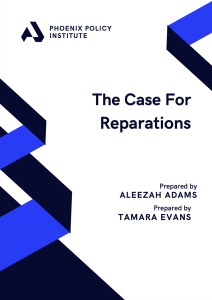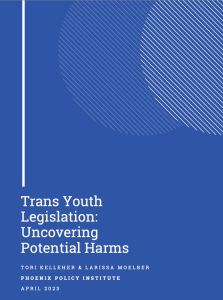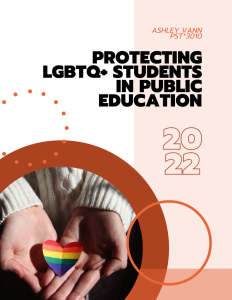- Home
- Academics
- Arts & Sciences
- Political Sciences
- Phoenix Policy Institute
- Human Rights Policy
Human Rights Policy
Human Rights
Criminal Justice
Breaking the Cycle: Examining Racial Disparities in Juvenile Incarceration
By: Danny Nickel
Published: Spring 2024

Abstract: In the landscape of juvenile justice, the evolving pursuit of equitable and rehabilitative responses to juvenile offenses encounters a formidable challenge: persistent racial disparities in juvenile incarceration. Despite substantial reforms, Black youth continue to be disproportionately represented in the juvenile justice system, reflecting systemic inequities that demand focused attention. This policy brief critically analyzes the problem of racial disparities in juvenile incarceration, contextualizes theissue within the federal and state-level policy landscape, and presents and evaluates three distinct policy alternatives aimed at mitigating racial disparities in the juvenile justice system.
Education
Protecting LGBTQ+ Students In Public Education
Published: Fall 2022
Abstract: Recently, there has been a rise in discriminatory policies in public education systems at the state level against LGBTQ+ students. More specifically, these policies have excluded LGBTQ+ identities from curriculums, extracurriculars, and student bodies, as a whole. This analysis aims to address this trend by examining potential solutions at a national level that will potentially give more uniformity to the fair and equitable treatment of LGBTQ+ students in public education.
International
Sex Work in Thailand: Addressing the Health and Safety Concerns of Its Legal Status
By: Parker Brownell, Katherine McCormick and Savannah Willette
Abstract: The sex industry in Thailand is a vast, influential sector of the state’s economy. However, due to its legalstatus, sex workers, who are predominantly poor, underage women, find themselves subject to abuse and corruption. Law enforcement officers have turned a blind-eye to sex work, leading officials to settle for inefficient practices in identifying victims of sex trafficking. Brothels also become centers of sexually transmitted diseases (STDs), with the potential to spread through Thailand and the rest of the world. Due to these conditions, it becomes clear that further regulation is needed to protect sex workers against abuse and STDs, as well as to curb trafficking-related activities.
Legislation
The Case for Reparations
By: Aleezah Adams and Tamara Evans
Published: Spring 2023

Abstract: This policy memo examines the history of government policies aimed at providing reparations or protections for certain groups in the United States, with a particular focus on policies related to black people. The memo discusses several key policies, including the Indian Self-Determination and Education Assistance Act, the Civil Rights Act of 1964, the Individuals with Disabilities Education Act, the Japanese American Evacuation Claims Act, and the Violence Against Women Act. Through a detailed analysis of these policies, the memo highlights the ways in which the government has sought to address historical injustices and provide protections for marginalized groups. The memo further examines recent policy proposals, passed by San Francisco’s African AmericanReparations Advisory Committee and the Evanston Illinois’ Housing Restorative Program, that showcase what reparations policies could look like and the potential barriers they face. Finally, the memo proposes several potential policy options for providing reparations specifically to black people in the United States, drawing on the lessons learned from past policies aimed at redressing historical injustices.
Trans Youth Legislation: Uncovering Potential Harms

By: Tori Kelleher and Larissa Moelber
Published: Spring 2023
Abstract: In the last two years, the United States has seen an uptick in proposed legislation that targets trans and non-binary youth, specifically regarding access to medical care. There are a variety of issues with the bills such as, those that aim to punish doctors for administering hormone treatment or surgeries, naming parents abusive for allowing their children to consider or undergo medical treatment, and even adding gender re-assignment surgery under the category of genital mutilation. All of these restrictions strip trans youth of their right to access medical care and produce dangerous and often ill- informed assumptions about trans health care in general.
Enforcement of Leahy Laws: Case Study of Israel and the U.S. Commitment to Human Rights
By: Baden Eaton, Mj Volpe, and Anya Bratić
Abstract: The Leahy Laws, named after Senator Patrick Leahy, prohibit U.S. funds for assistance to foreign security forces involved in gross violations of human rights (GVHR), such as torture and extrajudicial killings. Codified under Titles 10 and 22 of the U.S. Code, the laws are enforced separately by the Department of State and the Department of Defense, each with unique provisions and exceptions. This policy memo examines the challenges and inconsistencies in the implementation of the Leahy Laws, particularly in the context of U.S. aid to Israel. Despite reports of alleged human rights abuses by Israeli units, including the Netzah Yehuda Battalion, enforcement remains limited. This inconsistency undermines the credibility of the Leahy Laws as a tool for promoting human rights and reveals the tension between legal mandates and political considerations. The memo explores the current implementation, challenges and issues, and potential policy reforms of the Leahy Laws in order to better understand their effectiveness when attempting to uphold human rights objectives.


